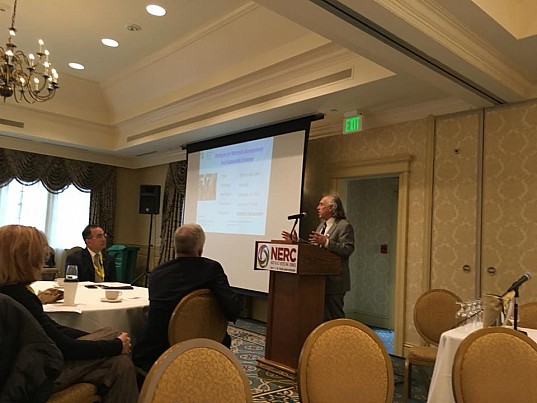December 5, 2017

Delivering the keynote address at NERC's Fall Conference last month, David Levine, co-founder and chief executive officer of the American Sustainable Business Council (ASBC), provided a sobering reminder of the challenges for the materials management industry.
According to the Environmental Protection Agency (EPA), Levine's presentation pointed out, national average recycling rates have essentially stalled at just under 35% for the past five years, after increases during the preceding two decades. On the other hand, the positive impacts of the industry on the national economy have been unmistakable:
- 60,000 businesses;
- 5 million jobs;
- $300 billion in sales of recyclables and recycling services; and
- 40,000 government programs.
Furthermore, his presentation revealed, many jobs in the materials management industry are locally based, which contributes to the building of strong local economies. Dollars earned by locally based businesses tend to stay in the community and support local job growth.
The organics sector is one fast-growing area of materials management that is particularly attuned to the benefits of local economies; in fact, Levine's presentation specifically suggested a decentralized composting infrastructure, and encouraging small-scale operations, as policies that will help reach ambitious food recovery goals.
I spoke with Levine after his presentation. “It is crucial that we work collaboratively to help get us to materials management systems that work for business and for the issues of society,” he said. Some ASBC business members, he continued, “have achieved zero waste certification.” Corporate zero-waste initiatives have led to direct savings in waste disposal and recycling of $388,000 by 2017, and another $50,000 in savings through product repair and reuse.
Many ASBC members also recognize the business case for such measures as reducing their environmental footprints and providing employees with fair wages and benefits.
“Sustainability is that balance between the financial, environmental, and social factors,” Levine said. “You can do well by doing good—which means if we move forward and address some of these key environmental and social issues—and at the same time you can grow a business and do well financially.”
“Speaking about materials management in a more sustainable framework is an opportunity for folks in the materials management sector to understand the role that they could play in driving toward a sustainable economy and society,” he continued. Without a renewed commitment to reducing our exploitation of natural resources, we are on an unsustainable path toward an ecological footprint of three planets by 2050.
Lacking a sufficiently robust regulatory regime, however, incentives for many businesses to adopt such measures as zero waste and increased recycling might lag; thus, ASBC has joined with numerous other organizations to support HR 1034, the Zero Waste Development and Expansion Act of 2017. Introduced by Congressman Keith Ellison of Minnesota, the proposed bill would establish a grant program to fund the infrastructure, technology, and community outreach needed to achieve zero waste.
Richard Eidlen, Vice President of ASBC, said of the proposed bill that it “encourages not only the recycling of materials in products, but also a re-design of the product itself so that it uses less raw materials.”
“Government has a role to play in setting definitions and guidelines to insure that we have a robust economy,” Levine said. “Without the baseline protections, less responsible companies are passing along negative environmental and social impacts onto the rest of us,” by externalizing such costs as environmental damages wrought by poorly maintained landfills.
(It is important to note that landfill operations can be managed in a sustainable way. In its 2017 sustainability report, NERC member Casella Resource Systems notes that its landfills can capture eight million BTUs of natural gas every minute. “We are working with a broad range of partners to establish the foundation for a Circular Economy, in which today’s discards become the raw material for tomorrow’s new products and services,” the report states.)
“ASBC is inviting the waste management world to work with ASBC to advance policies that support the shift to sustainable materials management,” Levine said. “Responsible businesses can help craft the kind of regulation that help them grow but also meet environmental and social criteria. We don’t have to choose.”
By Robert Kropp


Comments (0)
Add a Comment